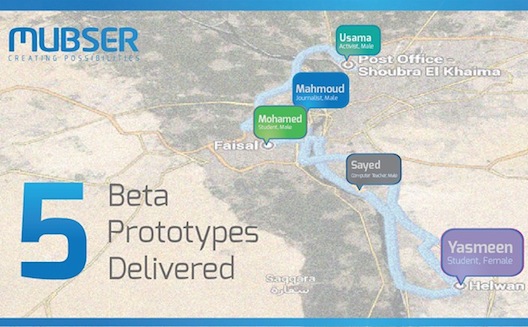Egypt's wearables developers hopeful in the face of hardship


The global wearable technology sector is already a multi-billion dollar industry. Yet Egypt is lagging behind in the race to create an iPod-esque market beater.
Inventors around the world are pumping out all kinds of digitally-enabled gear from jackets that will help you get home, to the Lebanese invention Instabeat that will measure your health stats while swimming*, Sony's "life-logging" band, and, of course, the controversial Google Glass.
It’s a sector that IHS analyst Shane Walker estimates could be worth $30 billion USD in 2018, up from the $10 billion it is now.
“Wearables moved from comic-book fantasy to mundane reality in the past decade thanks to multisensor combination packages and the low-power wireless chips that support them,” he wrote in the first quarter of 2014.
But in Egypt, despite the country’s wealth of computer engineers, only a handful of companies have moved into the wearable technology space. The small club includes Mubser, a year-old company that's developed a belt and headset kit called Sensify which helps visually impaired people avoid obstacles. And there's Drime, a company that only came together at Cairo's Startup Weekend three weeks ago and intends to build an app-and-bracelet combo to help people better manage their time.
According to industry figures the scant attention given to wearable technology in Egypt is largely due to two issues: amongst consumers there’s little awareness or demand for tech-enabled gear, and within the technology sector there’s a dearth of deep hardware manufacturing or design experience.
Flat6Labs CEO Ramez Mohamed says Egypt has the engineering talent to integrate internet-enabled technology into clothing and wearable devices, but the country lacks the consumer market and manufacturing capacity.
"It's very promising. I'd say from the tech side we have the expertise to design wearables [but] not manufacture [them]."
Mubser CEO and cofounder Khaled Abo Shady says high-tech manufacturing facilities and mentors who understand the needs of a hardware-oriented company are hard to find.
"Getting a [good] looking prototype is a very hard task here with the available resources… [there are] still a lot of facilities needed," he told Wamda. "A [small] number of mentors deeply understand what it takes to build a great hardware product with the different stages. But we have counted on international mentors who [are] helping us [to] solve some parts of the puzzle."
Entrepreneurs who are creating hardware products are beginning to try to close that gap, however.
 Amr Saleh is CEO and cofounder of Integreight, a company that designed and built a product called 1sheeld (pictured left) that turns your smartphone into an interface for Arduino programming software.
Amr Saleh is CEO and cofounder of Integreight, a company that designed and built a product called 1sheeld (pictured left) that turns your smartphone into an interface for Arduino programming software.
He says the hardware development ecosystem in Egypt is very small and he's been trying to encourage people to take an interest in the sector.
"We are organizing a monthly hardware startups meetup to share experiences and help each other with the challenges we face," he told Wamda, although the meetups aren’t organized around a wearable tech focus. The hardware hackathon that Saleh and his team at Integreight are planning, for November or December, will "hopefully" produce some projects involving wearable concepts.
Demand for Mubser's Sensify aid shows there is a market for innovative products designed within Egypt.
The aid recognizes objects using infrared depth data captured by a Microsoft Kinect sensor and RGB imaging. When the system sees an obstacle ahead it sends a signal to the belt to vibrate. It can even recognize basic objects such as chairs, doors or stairs, and names the object to the user via the Bluetooth-enabled headset.
Shady says Mubser has already sold five of the older-model prototypes and will launch the final version for pre-orders in April 2015. They will focus on the US and European markets, although Shady notes the Gulf also holds considerable potential.
"We have sold different prototypes to users who are passionate about what we are doing and want to try the product with us. We have a list of waiting users who are interested to buy the prototypes even though it's just a prototype stage; this reflects the high need for our solutions.”
 For Drime founder Hesham Kadry (pictured right), the biggest challenge – aside from nurturing a three-week-old startup – is creating awareness within Egypt. He says they are aiming at the US and Canadian markets but thinks a "personalized time coach" in the form of a mobile application and a bracelet will work well in Egypt.
For Drime founder Hesham Kadry (pictured right), the biggest challenge – aside from nurturing a three-week-old startup – is creating awareness within Egypt. He says they are aiming at the US and Canadian markets but thinks a "personalized time coach" in the form of a mobile application and a bracelet will work well in Egypt.
"I think the app will be really useful in Egypt," He told Wamda. "Here we have a problem with time... The main obstacle is getting people familiar with the concept of a wearable."
Plans are afoot to push the development of wearable technology within Egypt.
In January, Intel's new CEO Brian Krzanich launched the company's global 'Make it Wearable' competition.
The competition, which wraps up for 2014 in November, attracted over 300 submissions from Egypt, putting the country in the top four behind only US, India, and Germany. Although none of the over 300 submissions from Egypt made it to the finals, one woman's idea to make clothes that would capture and convert carbon dioxide to oxygen was short listed.
*Wamda Capital has invested in Instabeat.

